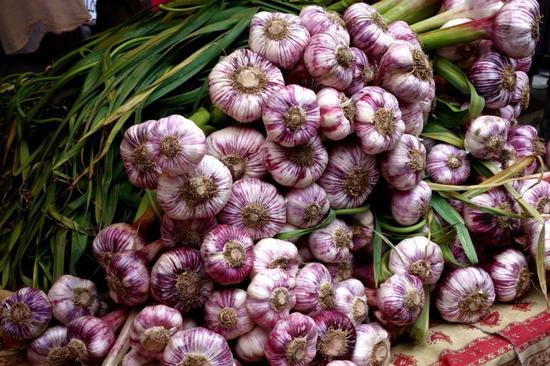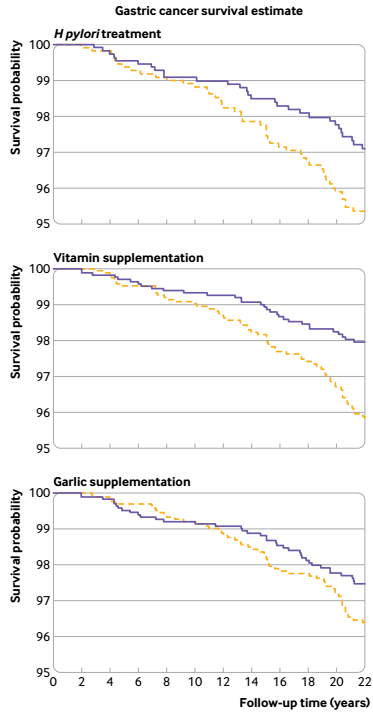Garlic extract can reduce the risk of death from gastric cancer
Recently, the price of pork has really gone all the way, and it has caught up with the beef. It has become a pig with the beans you play, Jiang Your Army, Sugar Gaozong, Ping, etc., of course, there is a garlic with a price of 7 yuan. You are jealous. Garlic is really awkward. If you eat some garlic at lunch, there is a smell in your mouth, and even a few meters around you can become a no-man's land.
But this garlic is also the heart of the knife, spicy, while also helping us to sterilize, anti-oxidation, and even prevent cancer [1].
Recently, Li Wenqing and You Weicheng of Peking University Cancer Hospital have conducted a 22-year follow-up study in Linyi, Shandong Province (qú, not gǒu), showing that Helicobacter pylori eradication, vitamin supplements, and garlic supplements can all be effective. The risk of death from gastric cancer was reduced by 38%, 52% and 34%, respectively. The study was published on the BMJ [2].

(from pixabay.com)
The number of deaths caused by gastric cancer can be among the top three in various tumors, and half of them occur in China [3]. Linyi, Shandong Province, is one of the regions with the highest mortality rate of gastric cancer in the world. It is estimated that between 1980 and 1982, 55 or 19 deaths per 100,000 men or women died of gastric cancer [4].
The high mortality rate of gastric cancer in Linyi is inseparable from the local eating habits. The main local staple sour pancake, made from overnight fermented cornmeal, often contains the carcinogen aflatoxin. According to statistics, daily consumption of sour pancakes is associated with a 30% increase in the risk of gastric cancer [4].
In addition, in Linyi, people generally lack selenium and vitamin C. The lack of these two nutrients is also associated with a high risk of gastric cancer [5,6]. The proportion of vegetables and fruits in the diet, including garlic, seems to reduce the incidence of gastric cancer [4]. It may be possible to prevent stomach cancer by supplementing vitamins and garlic.
To this end, the researchers conducted a trial in Linyi in 1995, testing vitamin supplements and garlic supplements, as well as the cure for Helicobacter pylori, the prevention of gastric cancer. At this time, H. pylori has just been classified as a Class 1 carcinogen by WHO for one year [7].

Linyi is this place (from Baidu map)
A total of 3,365 people participated in the trial. Of these, 2,258 Helicobacter pylori-positive participants received 2 weeks of Helicobacter pylori eradication, 7.3 years of vitamin supplementation, and/or 7.3 years of garlic supplementation in 2 x 2 x 2 groups. The remaining 1,107 Helicobacter pylori-negative participants received the same vitamin supplement and/or garlic supplement in groups of 2×2.
To cure Helicobacter pylori, 1 g of amoxicillin and 20 mg of omeprazole were administered twice daily for two weeks. After the breath test, the test was still positive, and the patient who did not clear the Helicobacter pylori was cured by a course of treatment.
Vitamin supplements, twice daily oral vitamin supplements, containing 250mg of vitamin C, 100 IU of vitamin E and 37.5μg of selenium, the first 6 months of the tablet also contains 7.5mg of beta carotene.
Participants who supplemented with garlic took two garlic supplements a day. Each time the drug contains 200 mg of old garlic extract and 1 mg of garlic oil obtained by steam distillation.

(from pixabay.com)
In the 15-year follow-up results published in 2010 [8], eradication of Helicobacter pylori showed significant effects in preventing gastric cancer, while vitamin supplementation and garlic did not significantly reduce the incidence and mortality of gastric cancer, but also showed Some good trends. Therefore, the researchers extended the follow-up period to 22 years.
During a total of 22.3 years of follow-up, a total of 151 people were diagnosed with gastric cancer and 94 died of gastric cancer. Of these, 119 cases of gastric cancer (79%) and 76 cases of gastric cancer (81%) occurred in people who were positive for H. pylori at baseline.
In the prevention of gastric cancer, the cure of Helicobacter pylori and vitamin supplementation showed good results, and the odds ratios reached 0.48 and 0.64, respectively. However, garlic supplements did not significantly reduce the incidence of gastric cancer.
In the prevention of gastric cancer death, all three methods have obvious effects. The eradication of Helicobacter pylori, vitamin supplements and garlic supplements reduced the risk of gastric cancer death by 38%, 52% and 34%, respectively.

Effects of three preventive methods on gastric cancer death (blue for the experimental group and yellow for the control group)
"These findings provide a potential opportunity for the prevention of gastric cancer, but further large-scale intervention trials are needed to confirm the good results of vitamin and garlic supplementation, and to determine the treatment of Helicobacter pylori, as well as vitamin and garlic supplementation," the researchers said. Any risk coming."
It should be noted that the participants in this study are from high-risk rural areas with malnutrition and may not be extended to well-nourished people.
Editing mystery
I don’t know this 200mg old garlic extract and 1mg garlic oil, which is equivalent to a few cloves of garlic.
However, the recent hot "artificial meat" is more like the red meat it imitates, or its raw soy products.
If you want to get first-hand scientific research information in time, then you must not miss the moment - and in a flash, a new version - instant. Instantly give you more:
Such as the dynamics of new drug development in the world;
Such as the hottest reviews of the latest academic research;
For example, the thinking of first-line clinicians;
Also, for example, a moment in your medical work. . .
As long as there is such a moment, there are a million possibilities.
references:
1. Nicastro HL, Ross SA, Milner JA. Garlic and onions: their cancer prevention properties [J]. Cancer prevention research, 2015, 8(3): 181-189.
2. Li WQ, Zhang JY, Ma JL, et al. Effects of Helicobacter pylori treatment and vitamin and garlic supplementation on gastric cancer incidence and mortality: follow-up of a randomized intervention trial [J]. Bmj, 2019, 366: l5016.
3. Bray F, Ferlay J, Soerjomataram I, et al. Global cancer statistics 2018: GLOBOCAN estimates of incidence and mortality worldwide for 36 cancers in 185 countries [J]. CA: a cancer journal for clinicians, 2018, 68(6): 394-424.
4. You WC, Blot WJ, Chang YS, et al. Diet and high risk of stomach cancer in Shandong, China [J]. Cancer research, 1988, 48(12): 3518-3523.
5. You W, Zhang L, Gail MH, et al. Gastric dysplasia and gastric cancer: Helicobacter pylori, serum vitamin C, and other risk factors [J]. Journal of the National Cancer Institute, 2000, 92(19): 1607-1612.
6. Zhang L, Blot WJ, You WC, et al. Serum micronutrients in relation to pre-cancerous gastric lesions [J]. International journal of cancer, 1994, 56(5): 650-654.
7. Schistosomes I. Liver flukes and Helicobacter pylori. IARC working group on the evaluation of carcinogenic risks to humans. Lyon, 7–14 June 1994 [J]. IARC Monogr Eval Carcinog Risks Hum, 1994, 61: 1-241.
8. Ma JL, Zhang L, Brown LM, et al. Fifteen-year effects of Helicobacter pylori, garlic, and vitamin treatments on gastric cancer incidence and mortality [J]. Journal of the National Cancer Institute, 2012, 104(6): 488-492.
Author of this article | Kong Yifan


评论专区